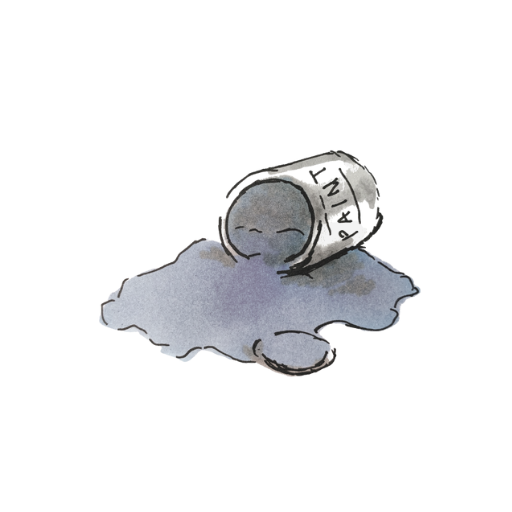
First of all, I’ll admit that I love a bit of white paint. I like white woodwork (I know that probably makes me a massive philistine but so be it). But I’ve never given a lot of consideration to how to decorate with white paint. I’ve always just gone for the same tin of white paint without a second thought. And now, I fear, I may have been making a mistake all these years.
One thing I know, and I don’t care what anyone says, is that a fresh lick of white paint on the windowsills, instantly transforms a tired room.

The colour psychology of white
Following on from my blog discussing the basics of colour psychology, this feels like a good place to start in thinking about white.
The basic science is that the colours we see are dictated by the amount of light absorbed or reflected. White reflects all light. In the west, the this lovely all-light-reflecting colour is thought of as pure, restful and clean. It often represents purity (think wedding dresses and baby clothes). However, it can also feel stark, sterile and dull if over-used or if the wrong shade is chosen.
In decorating terms, white is definitely much loved for minimalist or scandi-style interiors. It can be a useful blank canvas to build upon. Many of us use it to brighten a space (more on that later) and a pop of white can instantly refresh a room. However, white involves a little bit more consideration to ensure you get it right and end up with a tranquil and calming space rather than a living room that feels as clinical as a hospital ward.

White is just white, right?
To be totally honest, I personally hadn’t given this a second thought until this year when I started reading a lot more about colour and decorating generally. Like much of the country, before now, I would have just picked up a tin of Pure Brilliant White and been done with it, however, there will usually be a more appropriate choice for your space.
How to choose white paint for your space
First off, as mentioned, white reflects light. So, if you have a very dark, north-facing room for example, painting the walls with Pure Brilliant White isn’t going to help you. There will still be no light to reflect and the room will probably just feel a bit cold and sad as this particular hue is blue-based.
Pure Brilliant White
Turns out, Pure Brilliant White is a man-made hue developed after World War II. It doesn’t actually exist in nature. As a result, it can be hard for us to connect to and doesn’t always go easy on the eye. So far, so sterile! However, it is really popular (I believe, but don’t quote me on this, that it’s the best selling shade of white paint) because it does create a totally blank space. I can understand why an architect might want to use it to showcase the actual architecture, without getting caught up in the colours, which could draw attention away from their hard work. It can be very striking in the right place.
- Pure Brilliant White – Dulux
Where to use it?
We have a modern, pure white in our en-suite and I love it. This room is light-filled, with wall width windows and as a result, and the white in here feels fresh and bright. Pure white has no pigment, so it is best for bright rooms, where it can reflect the light and create an airy space.

If you want to go for a bright white, you can also try a shade which doesn’t have the blue tones of Pure Brilliant White and is a bit easier on the eye:
- Loft White – Little Greene
- Shirting – Little Greene
- All White – Farrow & Ball

Heritage Whites
Our house was built in 1901. We are lucky enough to have many of the period features the house was built with. Whilst our loft extension is a bright, airy and modern space, the rest of the house is typical Victorian terrace. For period homes like mine, the softer, more muted and slightly pigmented heritage hues are perfect.
Warmer whites are useful to help brighten darker rooms in a period property and a touch of pigment softens the starkness of pure white.
- Slaked Lime – Little Greene
- Wimbourne White – Farrow & Ball

How to decorate with white paint in north facing rooms
There will always be a temptation to paint a north-facing room bright white to try to maximise what little light there is. The problem with this is that with no natural light to reflect, the end result falls flat. It’s recommended to avoid white and embrace the darker room with a rich, cosy shade instead. If you really want something light, then a warmer, creamier white is your best choice.
- White Tie – Farrow & Ball
- Linen Wash – Little Greene
- Mannequin Cream – Benjamin Moore
- Old White – Farrow & Ball


How to decorate with white paint in south facing rooms
South-facing rooms are blessed with warm, bright light and as such the perfect space for decorating with cooler toned white paint. South-facing rooms can cope with brighter, blue based whites. If your white is too warm, it’ll probably end up looking rather more yellow than intended.
- Blackened – Farrow & Ball
- Decorators White – Benjamin Moore


How to decorate with white paint in east facing rooms
East-facing rooms are wonderfully bright in the morning as the sun wakes up. Pale colours work well in east-facing rooms and can be complimented with fresh whites. The colour changes throughout the day, so consider when you’ll be in that room most and decorate for the time of day. Always get tester pots and try them in a few different areas at different times of the day (you can paint them onto card and try in different places).
- Gauze – Little Greene
- Pearl Colour Pale – Little Greene

How to decorate with white paint in west facing rooms
West-facing rooms become bathed with golden light in the afternoon. Perhaps it’s just me, but I find the colours in my west-facing rooms change the most. My dark blue bedroom changes from a cool navy to a much warmer indigo as the day goes on. Choose a white that is complementary to your colour scheme and, as with east-facing rooms, check how the colour changes during the day.
- Slipper Satin – Farrow & Ball
- Shadow White – Farrow & Ball

Still not sure?
Farrow & Ball helpfully match a white to all their paints. So head over there next time you are redecorating.
You can also get in touch with a colour consultant at Little Greene or Farrow & Ball.
I hope you’ve enjoyed this delve into the world of white. Let me know what you think in the comments.
Enjoyed this blog? Subscribe by email!
Receive blog notifications, DIY tips, exclusive discount codes and interiors chat direct to your inbox when you sign up.
Love chatting interiors? Got a question about paint? Come and join the DIY & Decor Club!
Join our community of DIY and interior design enthusiasts! If you have a decorating dilemma, we are here to help!


